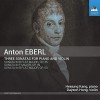Composers
Anton Eberl (13 June 1765 – 11 March 1807)[1] was an Austrian composer, teacher and pianist.
Eberl was born in Vienna and studied piano and composition from several teachers, including Mozart. Besides being an outstanding composer, he was a pianist of the first rank and toured throughout Europe. He wrote well over 200 works in nearly every genre. The opus numbers given to his works bear no relation to reality. Unfortunately most of his works have disappeared and only his chamber music has continued to receive contemporary performance, though three symphonies by Eberl were recorded by Concerto Köln in 1999.[2] His Trio for Piano, Clarinet and Cello, Op. 36, has been described by Professor Maurice Hinson as "one of the most valuable trios written for this combination during the classical period."
There was no composer whose works were more frequently passed off as Mozart's than Eberl. Even more surprising was the documented fact that there was no protest from Mozart against the use of his name on Eberl's compositions. Eberl, a friend and student of the great man, did mind but was too timid to take action until after Mozart had died. Finally, he published the following notice in a widely read German newspaper, "However flattering it may be that even connoisseurs were capable of judging these works to be the products of Mozart, I can in no way allow the musical public to be left under this delusion." Despite this, his works still continued to be published under Mozart's name.
This in itself was a reliable indication as to the contemporary opinion of the quality of Eberl's works but we also have contemporary critical reviews of his works such as that of the influential Berlin Musical Journal which wrote in 1805, after a performance of his new symphony, "Since the symphonies of Mozart, Haydn and Beethoven, nothing but this symphony has been written which could be placed alongside theirs." Indeed, Eberl's Symphony in E flat major was premiered at the same concert as Beethoven's Eroica Symphony on 7 April 1805, and it received rather more positive reviews than Beethoven's did.
Recently Added
Biography
Anton Eberl (13 June 1765 – 11 March 1807)[1] was an Austrian composer, teacher and pianist.
Eberl was born in Vienna and studied piano and composition from several teachers, including Mozart. Besides being an outstanding composer, he was a pianist of the first rank and toured throughout Europe. He wrote well over 200 works in nearly every genre. The opus numbers given to his works bear no relation to reality. Unfortunately most of his works have disappeared and only his chamber music has continued to receive contemporary performance, though three symphonies by Eberl were recorded by Concerto Köln in 1999.[2] His Trio for Piano, Clarinet and Cello, Op. 36, has been described by Professor Maurice Hinson as "one of the most valuable trios written for this combination during the classical period."
There was no composer whose works were more frequently passed off as Mozart's than Eberl. Even more surprising was the documented fact that there was no protest from Mozart against the use of his name on Eberl's compositions. Eberl, a friend and student of the great man, did mind but was too timid to take action until after Mozart had died. Finally, he published the following notice in a widely read German newspaper, "However flattering it may be that even connoisseurs were capable of judging these works to be the products of Mozart, I can in no way allow the musical public to be left under this delusion." Despite this, his works still continued to be published under Mozart's name.
This in itself was a reliable indication as to the contemporary opinion of the quality of Eberl's works but we also have contemporary critical reviews of his works such as that of the influential Berlin Musical Journal which wrote in 1805, after a performance of his new symphony, "Since the symphonies of Mozart, Haydn and Beethoven, nothing but this symphony has been written which could be placed alongside theirs." Indeed, Eberl's Symphony in E flat major was premiered at the same concert as Beethoven's Eroica Symphony on 7 April 1805, and it received rather more positive reviews than Beethoven's did.






